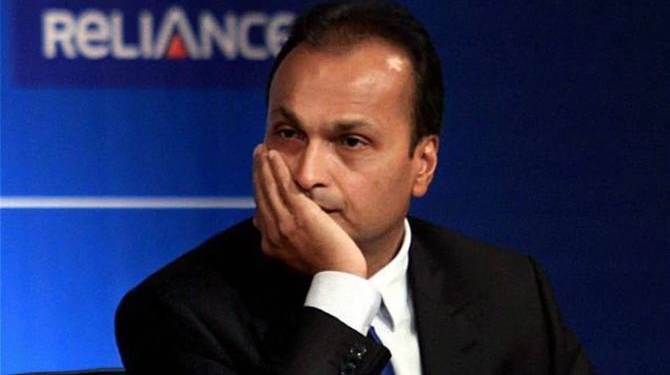Anil Ambani and four other directors of Reliance Communications namely Chhaya Virani, Ryna Karani, Manjari Kacker and Suresh Rangachar have resigned on Saturday. The decision came after the company posted a consolidated loss of 30,142 crore rupees in the second quarter, for which data was released on Friday.
“Your good office is hereby informed of the resignations tendered by the following directors of Reliance Communications Limited: Anil D Ambani, Chhaya Virani, Ryna Karani, Manjari Kacker and Suresh Rangachar,” said a letter addressed to Bombay Stock Exchange and the National Stock Exchange of India Ltd.
The Anil Ambani led company owes more than 50,000 crore rupees to various public and private sector banks. Reliance Communications (RCom), Anil’s mobile telephony venture, is all but defunct: the company owes its lenders Rs. 52,000 crores and RCom has just been reduced to fixed-line communications, data centre services and enterprise solutions with revenues of Rs 4,684 crore in fiscal 2018, a massive drop from the Rs 19,000 crore bagged in 2008. Market capitalization has plunged from a peak valuation of Rs 1, 65,917 crore in January 2008 to just over 1 percent of that value at Rs 1,687 crore on February 18, 2019.
The fall of Anil Ambani’s telecom business was the main burden that dragged down the entire business group itself. RCom which looked promising in its initial years flaunted a 20 percent market share, but the group was losing out to the competing GSM technology while the group operated on CDMA. However, Anil Ambani acted swiftly and shifted his bets to GSM and laid out services within 12 months. With an aggressive pricing strategy and investment of around 8,500 crores to buy 3G spectrum in 11 circles, RCom pushed to become the second largest telecommunications company in India with a massive 125 million customer base by December 2010, which was a fourfold jump for the telecom just five years after the family settlement.
The sudden surge of new players in the telecom space unleashed a price war and eroded margins for all. Consequently, RCom lost its number two spot to Vodafone in 2012 and slipped further down to number four in 2016. With growing debt-burden due to massive investment in Spectrum acquisitions the company’s ability to make investments, especially in 4G, were hindered. The firm’s debt doubled from Rs 25,000 crore in 2010 to the current figure of around Rs 43,000 crore. The launch of the aggressively low priced Reliance Jio by Anil’s elder brother, Mukesh Ambani certainly dealt a final blow and there was no recovering from it. Meanwhile, Reliance Group also made investments in the entertainment industry. However, in 2014, Reliance Entertainment sold its once acclaimed multiplex chain, Big Cinemas to pare off its debts.
While Mukesh Ambani’s Reliance Industries Limited (RIL) group stood at a market cap of around Rs. 7,70,592 crore, his younger brothers Group’s market cap was just pegged at 24,922 crores, in February this year. However, this stark contrast between brothers is not just limited to business empires but also seeps in on a personal level.
Anil Ambani is more like a western businessman. He is flashy, flamboyant, urbane, high-profile and accessible, he is dear to media as he regularly throws lavish parties for them. While his brother is known for keeping a safe distance from politicians at least in public eye, Anil is close to politicians like Mulayam Singh Yadav and Amar Singh, he also got a seat in Rajya Sabha from which he later resigned.
He has pioneered many innovations in the Indian capital markets and has had unparalleled success in raising capital from global markets for Reliance. He knows the world’s biggest international financiers by their first names and is the telegenic face of the company. He is known for trusting his managers and going with their opinions rather than involving himself in any project in great detail.
When Anil Ambani’s companies started making losses, he started summing up his business and planned to sell operations of Reliance communication to his elder brother Mukesh Ambani, but the deal could not capitalize because Swedish telecom giant Ericsson objected to the transaction.
Other subsidiaries of the Reliance Group like Reliance Infrastructure, Reliance Power and others have also suffered huge losses over the past few years and may follow the same insolvency path taken by RCom. The only business of the Reliance Group that seems to be doing relatively well is the financial services business under Reliance Capital, consisting of firms dealing with asset management, life and general insurance, home finance and wealth management. However, it remains to be seen how Anil Ambani steers the group out of its financial problems.




























